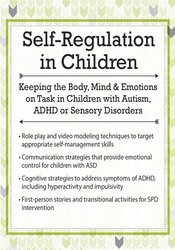
×

Children with Sensory Processing Disorders, ADHD or autism have much in common. They are challenged with physical problems that affect their ability to focus and can also cause them to be emotionally reactive. Children who have trouble self-regulating throughout the day are missing out on typical childhood experiences in school, on the playground and with their families. They have difficulty making and keeping friends.
This recording looks at the underlying factors of poor self-regulation and how they affect the child. The course emphasizes practical interventions! You will walk away with strategies for creating simple but effective programs in clinical, school and home settings:
Clinical programs such as Interactive Metronome® (IM), brushing, sensory diets, and MeMoves™ will be discussed, as will timely topics such as medication vs. non-medication for ADHD and new insights from research into biomedical aspects of autism.
NOTE: Tuition includes one free CE Certificate (participant will be able to print the certificate of completion after passing the online post-test (80% passing score) and completing the evaluation). Instructional methods will include PowerPoint, didactic lecture, and others.
Continuing Education Information: Listed below are the continuing education credit(s) currently available for this non-interactive self-study package. Program content is reviewed periodically per accrediting board rules for currency and appropriateness for credit. Credit approvals are subject to change. Please note, your licensing board dictates whether self-study is an acceptable form of continuing education, as well as which credit types are acceptable for continuing education hours. Please refer to your licensing board's rules and regulations. If your profession is not listed, please contact your licensing board to determine your continuing education requirements and check for reciprocal approval.
For other credit inquiries not specified below, please contact info@pesi.com or 800-844-8260 before purchase.
Materials that are included in this course may include interventions and modalities that are beyond the authorized practice of your profession. As a licensed professional, you are responsible for reviewing the scope of practice, including activities that are defined in law as beyond the boundaries of practice in accordance with and in compliance with your profession's standards.
For Planning Committee disclosures, please see the statement above. For speaker disclosures, please see the faculty biography.
Earn up to 6.25 CE hours. Please see below, for more details, as credit amounts vary by jurisdiction and profession.

PESI, Inc., #1062, is approved as an ACE provider to offer social work continuing education by the Association of Social Work Boards (ASWB) Approved Continuing Education (ACE) program. Regulatory boards are the final authority on courses accepted for continuing education credit. ACE provider approval period: January 27, 2023 - January 27, 2026. Social workers completing this course receive 6.25 Clinical continuing education credits.
Course Level: Intermediate Format: Recorded asynchronous distance. Full attendance is required; no partial credits will be offered for partial attendance.
Canadian Social Workers: Canadian provinces may accept activities approved by the ASWB for ongoing professional development.
This self-study activity qualifies for 6.25 continuing education clock hours as required by many national, state and local licensing boards and professional organizations. Save your activity advertisement and certificate of completion, and contact your own board or organization for specific requirements.
| File type | File name | Number of pages | |
|---|---|---|---|
| Manual - Self-Regulation in Children (229.1 MB) | 91 Pages | Available after Purchase | |
| Instructions for ASHA credit - Self Study (64.4 KB) | Available after Purchase | ||
| Illinois Educators Self-Study Instructions (15.4 KB) | Available after Purchase | ||
| Illinois Educators Evaluation Form (1.2 MB) | Available after Purchase |

Gwen Wild, MOT, OTR/L, is an occupational therapist with over 25 years of experience specializing in the treatment of children and adolescents diagnosed with Autism Spectrum Disorder, Sensory Processing Disorders, neurological disorders and a wide variety of developmental disorders in numerous settings. She is the owner of Sensational Brain, LLC, and creator of the popular BrainWorks™ tools, a system for creating effective sensory diets that empowers kids to take charge of their sensory needs.
Gwen is steadfast in helping children learn to self-regulate to manage their behaviors and emotions effectively. She works directly with educators, speech-language pathologists, occupational therapists, BCBAs and other professionals in her roles as an educator, consultant to two school districts and provider of private pediatric occupational therapy services in homes.
Gwen presents worldwide on topics related to sensory modulation and self-regulation teaching practitioners, parents, and teachers who work with children and adolescents practical treatments and interventions. She has been invited to speak at numerous state and local conferences and has been featured on podcasts. Gwen has led and co-authored two research studies on the implementation of sensory strategies for the purpose of enhancing self-regulation, the most recent of which was published in a peer-reviewed journal.
She is an active member of the American Occupational Therapy Association and at the state level, she is a member of the Michigan Occupational Therapy Association.
Speaker Disclosures:
Access never expires for this product.
Visit our FAQ page at https://www.pesicanada.com/faq or contact us at https://www.pesicanada.com/contact-us
| 5 |
|
| 4 |
|
| 3 |
|
| 2 |
|
| 1 |
|
Satisfaction Guarantee
Your satisfaction is our goal and our guarantee. Concerns should be addressed to info@pesicanada.com.
Please wait ...